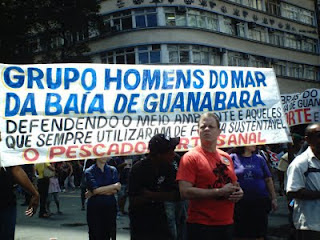Márcio Amaro was one of the founders of the Association Men and Women of the Sea (AHOMAR), which brought together artisanal fishermen on Guanabara Bay and fought the installation of gas pipelines and industrial sites on the bay. AHOMAR represented artisanal fishermen from seven municipalities in Guanabara Bay area and had 1,870 members.
Since 2007, it has systematically denounced the violations and crimes that occurred in the construction of the Rio de Janeiro Petrochemical Complex (COMPERJ). In 2009, AHOMAR fishermen occupied the construction works of the submarine and terrestrial pipelines for the transfer of LNG (Liquefied Natural Gas) and LPG (liquefied petroleum gas) carried out by the consortium of contractors GDK and Oceânica, contracted by Petrobras. This work directly impedes artisanal fishing in the Beach of Mauá-Magé, Bay of Guanabara where AHOMAR has its headquarters.
On 19 January 2010, three men entered Márcio’s home on the beach of Mauá, in the municipality of Magé and murdered him in front of his mother and his wife, The day before his assassination, he had delivered a report to the representative of Sindipetro (the official organisation representing the interests of oil producers) denouncing the activities of armed groups operating on the construction sites of Petrobras, the biggest oil producer in Brazil. This report had names, dates, lots of information.
The murder of Márcio Amaro occurs in the context of attacks against fishermen opposing the construction which comes 10 years after the biggest ecological disaster in Guanabara Bay. On the eve of his murder, Márcio had actively participated in a demonstration, in front of Petrobras, in protest against the impact of the disaster that caused a spill of 1.3 million liters of crude oil in the bay, causing irreparable damage.
The suspicion is that the members of AHOMAR were targeted by an armed group in the service of large companies, interested in the industrialisation of the area. This suspicion is borne out by the fact that just before Márcio’s murder another member of the organisation was also killed and other leaders of the organisation were constantly threatened. Information on the murder investigation could not be obtained. After Márcio’s death, in 2012 two other members of the association were killed and the president of the association has spent years protected under the Protection of Human Rights Defenders Program, having 24-hour protection.
